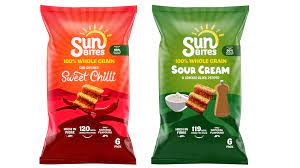
The ‘premium quality’ packaging contains 50% recycled plastic and meets stringent food contact requirements.
Launched in the UK and Ireland for PepsiCo snack brand, Sunbites, the packaging is made by recycling plastic waste into food grade packaging material. This is done using an advanced recycling process, a complementary approach to mechanical recycling, which enables the recycled materials to satisfy the demanding EU regulatory requirements for applications such as food contact packaging, contact sensitive and medical devices.
Several partners across the entire supply chain collaborated to enable the launch of this attractive new circular packaging, GreenDot ensured the procurement and supply of post-consumer plastic packaging waste, which was converted into TACOIL™ (pyrolysis oil) using Plastic Energy’s technology.
INEOS Olefins & Polymers Europe used the pyrolysis oil as an alternative to traditional fossil feedstock to first produce recycled propylene, before turning this into virgin-quality recycled polypropylene resin at its plant in Lavera, France.
IRPLAST used the new resin to turn existing plastic packaging designs into new packaging films that contain 50% of post-consumer recycled materials and meet the food contact performance requirements.
Amcor transformed these films into printed packaging that delivers the same technical performance for PepsiCo.
Using these new polypropylene films, PepsiCo launched the Sunbites packaging in the UK. The partnership is part of PepsiCo Positive (pep+), the company’s end-to-end transformation, which aims to eliminate virgin fossil-based plastic in crisp and chip bags in Europe by 2030.
The recycled polymer content is certified under the International Sustainability and Carbon Certification (ISCC PLUS) scheme, an independent third party who certify that it has been tracked through the production process using mass balance principles and that the claim being made is accurate.
The upcoming EU Packaging and Packaging Waste Regulation (PPWR) is expected to set out ambitious targets for recycling packaging waste for 2025 and 2030 across a range of materials and recycled content targets for plastics. The companies said that the achievement demonstrates that advanced recycling technologies can play a critical role in meeting the growing demand for the safe, circular use of recycled materials in food contact products, helping the EU to achieve its 10% recycled content objective for contact sensitive plastic packaging by 2030.
As well as preventing plastic from ending up in the environment and reducing the use of fossil based raw materials, the circular re-use of ‘end of life’ plastic can also help to reduce total emissions.
Laurent Auguste, CEO of GreenDot, said, “GreenDot has announced a new ambition in Europe to recycle more plastic postconsumer waste into quality circular polymers for food plastic packaging. Next to our goal of becoming a feedstock provider for advanced recycling, GreenDot is acting as an enabler of providing pyrolysis oil, working with partners to return plastic waste currently lost from the value chain back into the recycling loop together with our partners.”
Rob Ingram, INEOS Olefins & Polymers Europe North CEO, added, “INEOS Olefins & Polymers Europe is delighted to play a part in this innovation from PepsiCo. Successfully producing high quality, food contact packaging from plastic waste demonstrates that alongside mechanical recycling, advanced recycling is vital for creating materials that can be used in demanding applications. We look forward to working with partners to leverage the range of solutions our business has invested in to accelerate packaging circularity. Examples include our Recycl-IN hybrid polymer range and new pilot line for fully-recyclable machine-direction orientation films.”
Archana Jagannathan, chief sustainability officer at PepsiCo Europe, commented, “At PepsiCo, we are proud to work with our industry partners towards more sustainable packaging solutions. We are excited about the Sunbites new packaging in the UK, and we look forward to learning from this pilot market and expanding it across more countries in the near future. Collaboration is key to progressing on our ambition to eliminate virgin fossil-based plastic in all our crisp and chip packaging in Europe by the end of 2030.”
Gerald Rebitzer, sustainability director at AMCOR, added,“We are building a future where flexible packaging is part of the circular economy. Together with PepsiCo, we enhanced the material technologies on PepsiCo’s new crisp packet to make it easier to recycle. And we are beginning to integrate renewable and recycled content into PepsiCo’s packaging. To meet the demands of our clients like PepsiCo, we encourage more partners upstream to invest in the supply chains of these new materials.”





